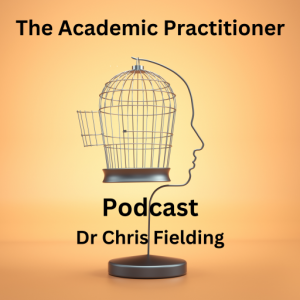As someone who journals with the aim of using reflexivity to improve my practice, I often look back at my writing and wonder – Why on earth did I write that? Why did I choose to write that particular something at that particular time and why on earth did I use the language that I did?
This post is the first in a series on reflexivity and a response to an article by Jacqueline Undurraga1 which argues that good quality reflexivity is about being aware of the complex weave of entanglements at play when we relate to the world and what this then produces. We do this moment by moment and taking this view, my writing is simply (or rather complexly) the product of a moment in time and if I am to understand it better, I need to consider how I related to the situation and the mechanisms or assemblages which brought that about.
This is in contrast to a more traditional view of reflexivity which authors such as Karen Barad (2007)2 find problematic. Barad describes reflexivity as an attempt by a previously formed subject to engage in a reflexive process and account for itself. This is a problem for those with a post-humanist view of subjectivity where subjects (in this case me) are not pre-formed but rather exist in relation to others. Barad (2007:342) describes how ‘The knower cannot be assumed to be a self-contained, rational human subject. Rather, subjects (like objects) are differentially constituted through specific intra-actions’. For this reason, those following Barad favour a move away from reflexivity. Undurraga, however, offers a way forward with the concept of performative meta-reflexivity. Performative meta-reflexivity asks us three questions:
- How am I relating at this very moment?
- What assemblages are bringing this about?
- What is that producing?
It is performative in the sense that here, reflexivity is an ongoing, dynamic, forever process. Barad’s (2007) view of reflexivity is that it does not acknowledge that in knowing (including ourselves) that we are producing something. Undurraga (2022:5), however, states that in a performative meta-reflexive process ‘there is no moment of standing back and reflecting that is not already a way of relating and a productive action’. I am sympathetic to the view. My journal entries are reflections on a situation. I then engage with and relate to my prior entries and produce new reflections which are subject to a whole new set of mechanisms acting at that point in time. We cannot step outside of the process. As Jacques Derrida (1997:24)3 put it ‘We are within meta-physics, even when we are putting a critical eye on it’.
This is not about generating sweeping statements about who I am as a professional or researcher. It is about attempting to understand the writhing mass of ‘local entanglements’ (Undurraga, 2022) affecting the way I relate to a situation. Barad (2007) describes voice as not belonging to an organism but emerging from a ‘becoming that includes all of what is relating at that moment, human and non-human’. I find this useful when trying to answer the question about why I wrote the things I did and rather to view the words as not my voice but more the product of a host of mechanisms acting at a moment in time.
Implications for practice
How might this help as I attempt to improve my practice. I love this from Undurraga.
‘Using meta-reflective questioning requires me to stay within the sometimes embarrassing, contradictory, troubling, constraining and enabling fact that at any given moment I am relating in ways that are very distant from my best intentions.’
Rather than shy away from these realisations, I need to seek them out and embrace them. In the course of my daily work, I need to continually ask if I am relating in ways that I find troubling. I need a way to capture those moments and then try and make sense of the entanglement of mechanisms that is bringing them about. When I re-engage with my writing, how am I relating to it? Do I feel troubled about something, do I feel constrained by the language or is there just something about it that is producing a feeling of queasiness? These are the moments that allow us to step through the portal and gain greater understanding of our ongoing, dynamic place as professional in the midst of the process we are trying to understand.
You can read Jacqueline Undurraga’s full article by clicking on the link below. I have also added it our list of useful resources here.
- Undurraga, J.K.A.S. (2022) ‘Betraying our best intentions: on the need to interrogate how we relate and what it produces’. International Journal of Qualitative Studies in Education, DOI: 10.1080/09518398.2022.2098409
- Barad, K. (2007). Meeting the universe halfway quantum physics and the entanglement of matter and meaning. Duke University Press.
- Derrida, J. (1997). Of grammatology. Johns Hopkins University Press.

